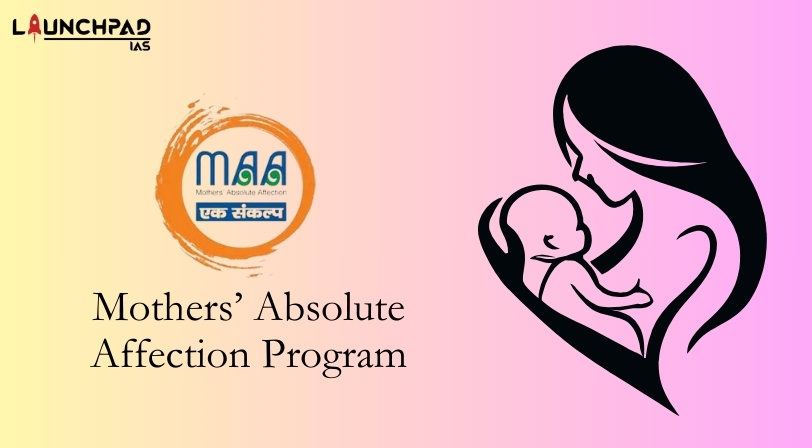About:
- MAA – “Mothers’ Absolute Affection” is a nationwide program of the Ministry of Health and Family Welfare in an attempt to bring undiluted focus on the promotion of breastfeeding and the provision of counseling services for supporting breastfeeding through health systems.
- The program has been named ‘MAA’ to signify the support a lactating mother requires from family members and health facilities to breastfeed successfully.
Objectives:
The goal of the ‘MAA’ Programme is to revitalize efforts towards the promotion, protection, and support of breastfeeding practices through health systems to achieve higher breastfeeding rates.
The following are the objectives of the Programme:
- Build an enabling environment for breastfeeding through awareness generation activities, targeting pregnant and lactating mothers, family members, and society to promote optimal breastfeeding practices. Breastfeeding is to be positioned as an important intervention for child survival and development.
- Reinforce lactation support services at public health facilities through trained healthcare providers and skilled community health workers.
- To incentivize and recognize health facilities that show high rates of breastfeeding along with processes in place for lactation management.

Components of MAA
- Enabling Environment and demand generation through mass media, mid-media, and community.
- Community level activities
- Orientation of ASHAs/AWWs and interpersonal communication and community dialogue through mothers’ meetings conducted by ASHA.
- Trained ANMs at sub-centers to provide skilled care in the communities.
- Capacity building of healthcare providers
- Capacity building of ANMs/nurses/doctors – at all delivery points.
- Role re-enforcement regarding lactation support services.
- Awards – Recognition for best performing baby-friendly facilities.
Benefits of Breast Feeding:
- Breast milk alone is the best food and drink for an infant for the first six months of life. No other food or drink, not even water, is usually needed during this period. But allow infants to receive ORS, drops, syrups of vitamins, minerals, and medicines when required for medical reasons.
- After 6 months of age, babies should be introduced to semi-solid, soft food (complementary feeding) but breastfeeding should continue for up to two years and beyond because it is an important source of nutrition, energy, and protection from illness.
- From the age of 6–8 months, a child needs to eat two to three times per day and thereafter, three to four times per day starting at 9 months – in addition to breastfeeding. Depending on the child’s appetite, one or two nutritious snacks, such as fruit, and home-made energy-dense food, may be needed between meals. The baby should be fed small amounts of food that steadily increase in variety and quantity as he or she grows.
- During an illness, children need additional fluids and encouragement to eat regular meals, and breastfeeding infants need to breastfeed more often. After an illness, children need to be offered more food than usual, to replenish the energy and nourishment lost due to the illness.
Benefits of Breastfeeding to the baby and mother as below:
- Benefits for the baby
- Early skin-to-skin contact keeps the baby warm.
- It helps in early secretion of breastmilk.
- Feeding first milk (colostrum) protects the baby from diseases.
- Helps the mother and baby to develop a close and loving relationship.
- Decreased risk of illness such as diarrhea, pneumonia, ear and throat infections. • Improved intelligence.
- Ensures development and growth.
- Benefits for the mother
- Helps the womb to contract and the placenta is expelled easily.
- Reduce the risk of excessive bleeding after delivery
- Reduces the risk of breast cancer, uterine cancer and ovarian cancer
- Lessens osteoporosis
- Benefits child spacing
- Promotes post-partum weight loss
- Costs less to feed the child


